What is blockchain technology?
An extensive data registry allows information to be stored as specialized blocks. These are necessary to maintain the principle of immutability that supports all technology. This creates opportunities for organizations and individuals to use blockchain technology in various applications, startups, and operations.
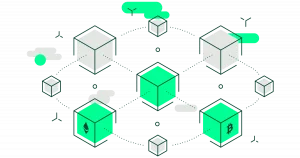
In fact, not many people know about what is blockchain technology yet. Read the benefits you will get thanks to this knowledge in the article below!
How does blockchain work?
Understanding the basics will allow you to take advantage of all the opportunities. That is why you should ask yourself what is blockchain technology and start learning. First, take a look at this list, which consists of important facts:
- distributability. Unlike classical systems, no central administrator will be responsible for storage and vulnerable to some extent. All information will be located at once on various devices around the world. This provides the principle of protection and availability;
- sustainability. The basic principle of any cryptocurrency is its honesty and security;
- transparency. Anonymity is another important aspect of token popularity. Absolute confidentiality is impossible to achieve, as all transactions are visible. In this way, equality of opportunity between different users is maintained;
- decentralization. The system doesn’t need managers. Different blockchains may adhere to this concept to varying degrees.
Due to this, each set of transactions will remain in its place. Understanding what is blockchain technology cannot be ignored because even the big funds are into it at the moment. This is an extremely broad question that requires an understanding of any network’s basic steps.
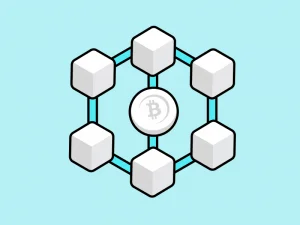
Transaction process
First, you must understand how the blockchain works, making each transaction unique and secure. The ability to achieve complete trust in user transaction processing is one of the most important aspects of the technology.
Here is what a transaction consists of:
- Creation. An important aspect of any transaction remains the sender’s signature, which is exposed by validating the key. This makes the question of what is blockchain technology easier to answer. Due to this, the right of ownership is confirmed.
- Validation. Specialized validators or miners can be called network nodes and use special validation algorithms. The transaction then becomes a full-fledged part of the entire blockchain.
- Formation. All information is distributed among the participants, so copies do not allow the whole system to be falsified.
- Reconciliation. It must prove that the operation was performed and can be considered legitimate. After this step, its contents cannot be changed.
- Distribution. By adding blocks, nodes update information about the blockchain, and thus, an important security principle is observed. This whole system is built on the fact that to give a guarantee of legitimacy of ownership and transfer of an asset, information, other.
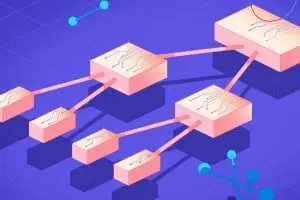
If all this is presented in the example of classical operations in the banking sector, it will be easier for you to understand what is blockchain technology. It just needs to provide additional transparency and data security.
Decentralization of blockchain
In most cases, studying the question of what is blockchain technology sooner or later, you will encounter a lot of questions and assumptions. To avoid this, our experts decided to provide information on all the main features of this system feature. By understanding what is blockchain technology, one can easily continue to implement it in various areas of life and work.
| Decentralization of blockchain | ||
| Features | Advantages | Problems |
| Blockchain does not have a single server with all the information. In most cases, many machines are used at once to store information. All of them will be nodes in the system. | Any user can view the features of each transaction at any time. You cannot hide, move, or change anything. | At the same time, scalability remains a big challenge because processing time can increase significantly due to the number of users. |
| A special decentralized system avoids massive attacks on the servers. Thanks to this, tampering will not occur, and the recorded blocks will remain intact. | A decentralized system allows for maximum straightforwardness in every transaction. You don’t have to worry about intermediaries, their fees, or increased processing times. | The system constantly needs additional computing power to validate each transaction. The same PoW system has certain computational requirements. |
| A shared system without central control is much more efficient and safer for each individual user. | Due to the democratic nature of the blockchain, every user has the same rights. This ensures that the principle of trust is not violated. Regardless of your status or capabilities, you can access information about every transaction. | Changes or updates to the protocol can cause the community many problems. There is no one person here who will decide on their own. |
All of this makes for a truly innovative way to manage your data. Radical differences from traditional systems make the system attractive to all participants simultaneously. At the same time, several challenges arise from the social and technical aspects of the system to be solved. The whole community will face and solve them in the long run.
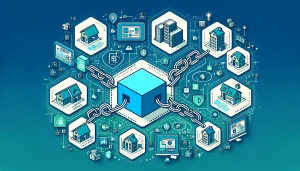
We can talk about three eras of currency: commodity/product based currency, political based currency, and now a currency with a mathematical foundation.
Chris Dixon
Blockchain transparency
Understanding what is blockchain technology is will allow you to understand the entire system, including its transparency. This key principle allows decentralization and the technology itself to remain mutually controlled. This is why scammers get a lot of trouble when trying to get into the system and use transactions.
The main advantages and features include:
- openness. It is necessary to understand the peculiarity of the work, which does not allow the disclosure of exactly the people’s data. That is, confidentiality has a certain degree, but at the same time, everyone can see the entire history of various transactions;
- permanence. The main advantage is that the information can be trusted because the blocks will not change dozens of times. Due to this, the principle of trustworthiness is observed;
- trust. Sharing information and data through transactions attracts many users who value security and transparency.
- control. Tracking helps to reduce fraud. Experienced network participants can tell that, in this case, you are dealing with abusers just by looking at their ledger;
- simplification. Ease of access allows organizations and individuals to use the system actively. At the same time, it simplifies things for regulators, who may not be as stringent in their new requirements for the entire ecosystem.
With the system in place, everyone can eventually use the technology and build a trusted digital ecosystem. At the same time, we should not forget about the limitations that affect the accessibility of information.
Here are a few of these issues:
- privacy. Blockchain is difficult to use for sensitive information that requires special treatment and anonymity;
- volume. Analyzing and processing information takes a large amount of time if you don’t have the experience to work with the technology directly;
- comprehension. In most cases, users lack the knowledge to work directly with the blockchain blocks. Everyone can access verification, but not everyone can take advantage of this opportunity and correctly work with the data.
This way, a balance is maintained between general information availability for everyone and a certain level of anonymity when working with blockchain technology. Each participant in the system becomes a transaction controller, increasing safety and security.
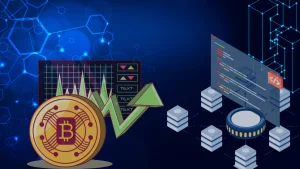
Bitcoin vs. blockchain
The concepts are often used together, but in fact, they are quite different. Blockchain technology is not Bitcoin.
The emergence of crypto allowed the field to start strongly because investors, traders, and various anonymous participants saw opportunities in the blockchain sector. Due to the features of working without intermediaries, millions of people now use such transactions daily.
The technology, in turn, is the basis for any systems created on its basis. Differences:
- purpose. Technology is used in most fields to create unique, trusted solutions without centralization. At the same time, bitcoin remains an alternative currency;
- application. The use is limited only by the applications created and your imagination. At the moment, even in medicine, such mechanics are used. Cryptocurrency is limited to the field of finance, where it can be used as a unit of payment;
- potential. At the same time, crypto itself is an important manifestation of technology. Thanks to it, most users became aware of the sphere in the first place. Conversely, the technology can be used in many projects based on its various principles. Transparency and smart contracts will help businesses, while decentralization will appeal to companies forced to work with security protocols.
In fact, understanding what is blockchain technology comes after understanding the differences. By doing so, you will be able to properly understand the ecosystem contributions of each concept and successfully apply them to your business, daily life, or other.
Every informed person should know about Bitcoin because it can be one of the most important developments in the world.
Leon Louw

What is the blockchain used for?
The question of what is the blockchain will be clear to you because the sphere is developing rapidly, and every year, there are only more active participants. Therefore, the use of the technology is limited only by the user’s capabilities. Here are just a few of them:
- financial services. It was especially popular in the service industry. Thanks to this, assets can be used as payment without problems. Thanks to technology, it is possible to decentralize fund transfers and use various DeFi format applications. Due to this, you can insure your life or even get a loan on the account if you meet all the conditions;
- logistics. A possible application is the validation of the entire supply chain. Thanks to this, it is possible to trace the very appearance of any asset, thus confirming its legitimacy. It is possible to achieve a reduction in the percentage of counterfeits;
- verification. The use is not limited to services or goods because the service is useful for verifying customer identification. That is, a signature can verify everyone if the technology is applied correctly;
- smart contracts. The great thing about blockchain is that it automates various processes and agreements. By fulfilling the terms of such contracts, an asset can be quickly transferred between two users or companies;
- copyright. The most important use of the system is on the Internet. By doing so, the big problem of copyright on the internet can be solved, and intellectual property will be under full evidentiary protection.
The possibilities are truly unlimited by technology, only by human imagination. Therefore, more people are learning about what is blockchain technology all about. In time, you can conduct even presidential elections through the system, which would significantly improve. These are some really cool opportunities that await us down the road.
Benefits of blockchain
New users come in every month because the interest in blockchain management only grows. Because of this, the number of entrepreneurs and companies using the system is growing significantly. Over time, it becomes the decisive and most important factor in operation and development.
Here are a few important advantages that influence this:
- security. Complete security ensures that most investors and traders are interested in such technologies;
- traceability. Access to all information is permanently open and available for all to see. Thanks to this, any user can trace assets, transactions, and goods along the chains;
- efficiency. Thanks to the possibility of direct interaction between several participants, the efficiency of using intermediaries is reduced, which means lower commissions and other negative parameters;
- immutability. The content of the information does not change over time, which is trusted by companies and private users alike;
- decentralization. Operating without constant control on one side can increase the entire system’s efficiency. This increases the efficiency of processing.
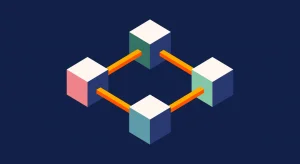
Figuring out what is blockchain technology and how does it work can be done by anyone who researches the field enough. It is useful, important, and modern. It is an extremely advantageous and efficient technology in various security, calculations, and verification areas. Every user connected to the blockchain enjoys all the benefits and maximizes the value of the blockchain. In this regard, we can conclude that blockchain is a rapidly evolving platform with a future.
What are the drawbacks of blockchain
Even knowing what is the purpose of blockchain you should realize that the technology also has its challenges that the community has yet to deal with. The new mathematical era allows us to envision possibilities in the future when blocks will be easier to process. Here are a few important issues to consider while working:
- scalability. The main problem remains the limited bandwidth, which requires continuous algorithm improvement. Processing times can change for the worse if the number of operations themselves also increases;
- power consumption. The system constantly needs computing power to operate efficiently. Due to this, energy is consumed, and this raises concerns for environmentalists;
- privacy. Blockchain allows for complete transparency of transactions but becomes a challenge for those who want to maintain their privacy. Developing private solutions is currently a challenge;
- integration. The lack of standards and technical complexities make integrating blockchain into your company difficult. At the moment, intermediate solutions have to be used;
- legal aspects. The lack of clear regulation leads to the fears of investors and various organizations that may face problems with further tightening rules. The state of uncertainty hinders the development of the whole sphere.
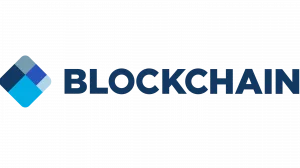
It is for these reasons that research in the field of technology should never be stopped. Only with the gradual development of the community and all the surrounding sectors can these problems be overcome and more effective solution strategies built around them. In this way, blockchain and everything related to it can overcome the problems and become the perfect system for everyone, but it will take time and experience for both the system and the users. There is a lot of potential, so there is always a chance for success.
Bitcoin is a remarkable cryptographic achievement, and the ability to create something that is not replicable in the digital world has tremendous value.
Eric Schmidt
How can blockchain evolve over time?
In general, the future fate depends on the application and environment. The revolutionary mechanism is most likely to evolve, according to our experts, in the following directions:
- improving protocols. Next-level solutions will also be needed to improve transaction processing efficiency and create new confirmation protocols. Due to this, the consensus phase will remain but will become less energy intensive;
- DeFi development. Over time, finance technologies will only become more efficient and complex. We need to start integrating such tools into traditional systems so that more users can start using them in their daily lives;
- improving privacy. Due to the system of work in place, confidentiality is fully respected. In the future, there will be more solutions that combine the advantages of both principles;
- DApps. Contract development will increase the influence of decentralized applications in ordinary life. From voting and medicine to efficient verification and increased security in the whole sphere;
- standardization. Adapting blockchain to simple organizations and companies. This can be achieved by adapting legislation and eliminating uncertainty in standards.

Over time, blockchain will evolve and eventually adapt to all modern challenges, leading to large-scale system integration in many familiar areas of human life. Now you know blockchain, you can join the vast community yourself.
The system has great potential and can reach many users who will find it useful and important. It has been doing this up to now, and it is rapidly developing its performance. Users say it is convenient and practical for everyone. However, whether blockchain can break through to global reach for literally everyone and whether it will be interesting and useful enough, we will find out over time.
Author’s opinion
Nelson Theresa
In our view, digital technology continues its rapid growth and will not stop there. Their development will be influenced by how quickly companies, organizations, and even acquaintances on the street start using blockchain services. The gradual introduction of technology into various spheres of life will make it possible to exclude intermediaries from many schemes, speed up work, processing, and auditing of finances, and reduce the influence of the human factor on agreements and contracts.
Whether blockchain will cope with the current challenges and continue its spread – we will be able to see very soon.